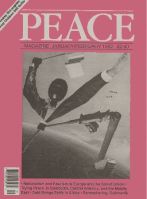
Peace Magazine Jan-Feb 1992, page 13. Some rights reserved.
Search for other articles by Joe Flexer here
In the period leading up to the Gulf War the Bush administration raised a mighty smokescreen to cover its aggression against Iraq. It claimed that, after the war, the U.S. would pursue the peaceful resolution of the problems facing the region, including the Palestine question.
Well, the war is over and the "New World Order" is taking shape in the current peace conference. Justice for the people of Palestine seems not to be a part of it. Israel remains committed to incorporating the territories it now occupies and the U.S. is not applying serious pressure to dissuade Israel.
The process of incorporation is underway in the West Bank, the Gaza strip, and the Golan. Already 65% of the arable land of these territories has been expropriated and is being colonized. About 95% of the water resources of the area are allocated to these settlement projects.
The U.S. has called on Israel to halt the establishment of new settlements; however, the Americans' difference with the Shamir government may be over the timing, not substance.
Since the Gulf War the number of Palestinian workers allowed to work inside Israel has fallen from 100,000 before the Gulf War to 30,000 currently. Their places are being taken by recent immigrants from the Soviet Union. Moreover, the very considerable remittances that came from Palestinians working in Kuwait have all but dried up. The authorities have been denying licences for the establishment of enterprises. The result is a gradual denial of means of subsistence, forcing a growing number to leave.
On the military front, the repression of the Palestinian population continues. In a recent report, A.I. has documented the systematic mistreatment of Palestinian detainees. Israeli prison camps stand accused of being virtual torture chambers. According to the A.I. report, some 35,000 Palestinians have undergone this treatment since the onset of the Intifada in December, 1988. All of these practices, again according to A.I., are officially sanctioned by the Israeli government.
The army and police shoot to kill militants who seem to be leaders. The systematic brutalization and killing of children has been well documented by Canadian professor James Graff.
Israel's diplomacy has been revealed in Madrid and Washington. One of its objectives was to exclude any recognized role for the PLO, which it calls a "terrorist group." Since there are no credible Palestinian leaders outside of the PLO, this plan failed.
Nonetheless, the weakness of the Palestinians is shown by Israel's unwillingness to even discuss the creation of an independent Palestinian state, which constitutes the only road to stable peace in the area. What Israel appears willing to discuss is an old formula, "autonomy." Today this means the withdrawal of Israeli forces from urban centers of the territories and the establishment of Palestinian-led municipal governments charged with organizing the collection of garbage.
The desperate current Palestinian situation may compel them to see such an arrangement as a respite. Israel, for its part, might see such an arrangement as a stopgap tactic to win time. This will not lead to peace but sow the seeds for new and more terrible wars.
The Israeli objective is to force the Arab states to abandon the Palestinians. This is the meaning of Israel's current call for "direct negotiations" with the Arab states.
The U.S., like the Israelis, are determined to prevent the emergence of a Palestinian state. They want to satisfy Israel, yet also firm up the client status of the Arab states in the region. Their formula, "land for peace," has little practical meaning for the Palestinians. It probably has more meaning in regard to the Golan, since the Americans want to bring onside the Syrian regime, which has already all but abandoned the Palestinians.
It is difficult to discern what options remain for the Palestinians. Their appeal to the world to protect the population of the territories seems to have fallen on deaf ears.
The current ascendancy of U.S. power in the region is far from bringing stability. though it can delay social and political upheavals. National and social struggle, especially by the Palestinians, is more likely to be the future of the region rather than so-called peace of Bush's New World Order.
Joe Flexer is a Toronto activist.

Peace Magazine Jan-Feb 1992, page 13. Some rights reserved.
Search for other articles by Joe Flexer here